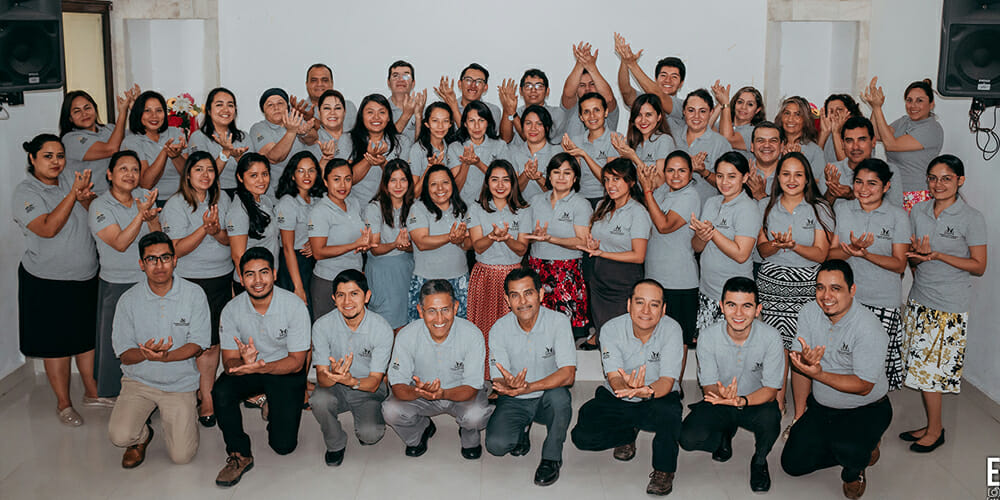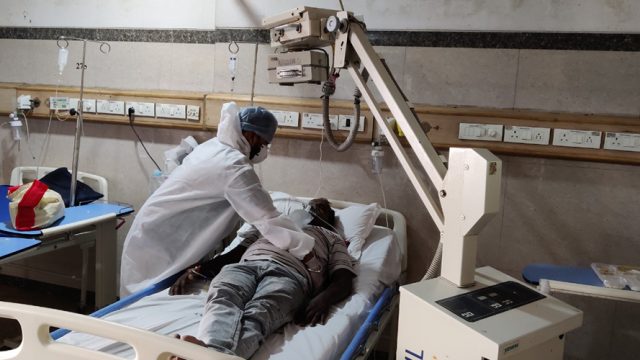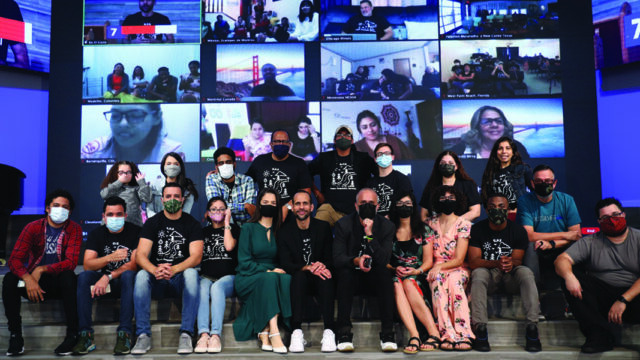Event is part of a plan to reach out to people with special needs, leaders said.

As part of ongoing efforts by the Seventh-day Adventist Church in Mexico to better reach the hearing impaired in their churches and communities, a group of Adventist interpreters gathered recently for a special training workshop in Villahermosa, Tabasco.
The 47 student interpreters from across three major church regions in Mexico met to enrich their knowledge, understand their mission, and strategize to further the ministry of sharing the gospel in sign language to the hearing impaired.
“We thank God because He is strengthening His people just at this time of the end so that the great mission of preaching the gospel in every tongue can be fulfilled,” said David Maldonado, special needs ministries director for the church in North Mexico. “The church around the world is building bridges to reach the deaf community, and it is important that we ensure that interpreters are trained in the Mexican Sign Language,” Maldonado explained.
The training workshop is the second such initiative in a comprehensive special needs ministry effort begun by the North Mexican Union seven years ago, organizers said.
This year, the church in the Southeast and Inter-Oceanic Mexican Unions gathered a group of their own for the Second Annual Interpreters Workshop in Mexican Sign Language, which provided 50 hours of training, July 22-27, 2019, at the 27 de Febrero Adventist Church in Villahermosa.
Adventist interpreters who responded to the calling are all volunteers, Maldonado said. “They use their own resources and time to prepare and serve the deaf in their churches and communities.”
A Team of Interpreters
The church in North Mexico has counted 169 church members who have been identified as deaf, and the plan is to continue providing the training and tools to teach and train local churches. The goal is that the church may be prepared to receive and include the new members who are deaf in the life of the church.
“This plan is so important because we need to have a team of interpreters that can assist us for this great deaf population we have not been able to reach yet,” Maldonado said.
The workshop grouped interpreters in three levels from basic to advanced. Strategies were set to provide a training plan for each level to include two workshops per year for the advanced level, including online training once a week on Sunday. The intermediate group will go to regional workshops to help them move to the advanced trained group to assist those in the basic level, Maldonado explained.
The six-day training event reviewed the use of signs and the use of sign language, ambiguous words and sentences, phrases and proper idioms, proverbs, and parables from the Bible. Interpreters took part in group session exercises and time for exchanging experiences.
Daniel Vergara said he was thankful and ecstatic to have learned to sign so many words. Vergara has been assisting a group of hearing-impaired people in Guasave, Sinaloa. He was part of the basic-level group during the event. “I have gained so much through this training. I just had to come to see how I can better help our deaf brothers and sisters back home,” Vergara said.
At only 15, Estrella Ramírez took part in the intermediate group of interpreters. She studies at Montemorelos University’s preparatory school and signs during the university’s church service on Saturdays (Sabbaths). “I want to be an interpreter for the deaf for the rest of my life,” she said. Ramírez thanked instructors and those in the advanced interpreters’ group for correcting some of her signing expressions and teaching her to sharpen her skills.
Facilitating More Training
The goal is to strengthen and facilitate more training for dedicated interpreters like Vergara and Ramírez, Maldonado said.
So far, the church in North Mexico has been organizing and supporting an annual Adventist national congress for the deaf for the past three years. In addition, interpreters have been invited to be part of the union’s executive meetings to help be part of taking decisions and initiatives that will reach the deaf and those with special needs across the church territory.
In his special message for the interpreters-in-training, Arturo King, president for the Adventist Church in North Mexico, praised and thanked them for their commitment to reach the hearing impaired and those with special needs.
“What a joy it is to know that there are members who want to extend their arms of compassion and love toward persons who don’t have the privilege of hearing,” King said. “We are so grateful because God has put in your heart to share the good news of salvation with this group in need of our support and care.”
The original version of this story was posted on the Inter-American Division news site.








